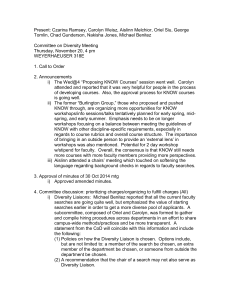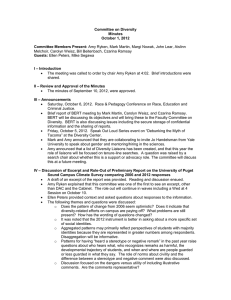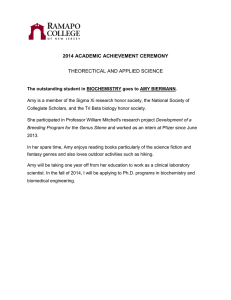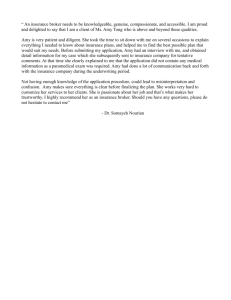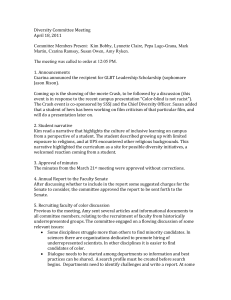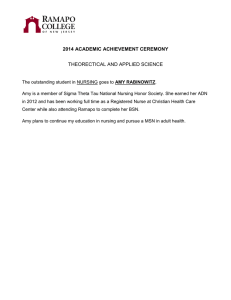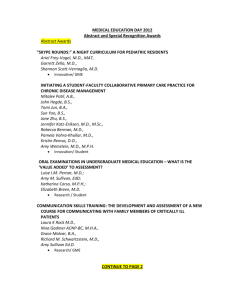Committee on Diversity (CoD) Minutes May 6, 2013
advertisement
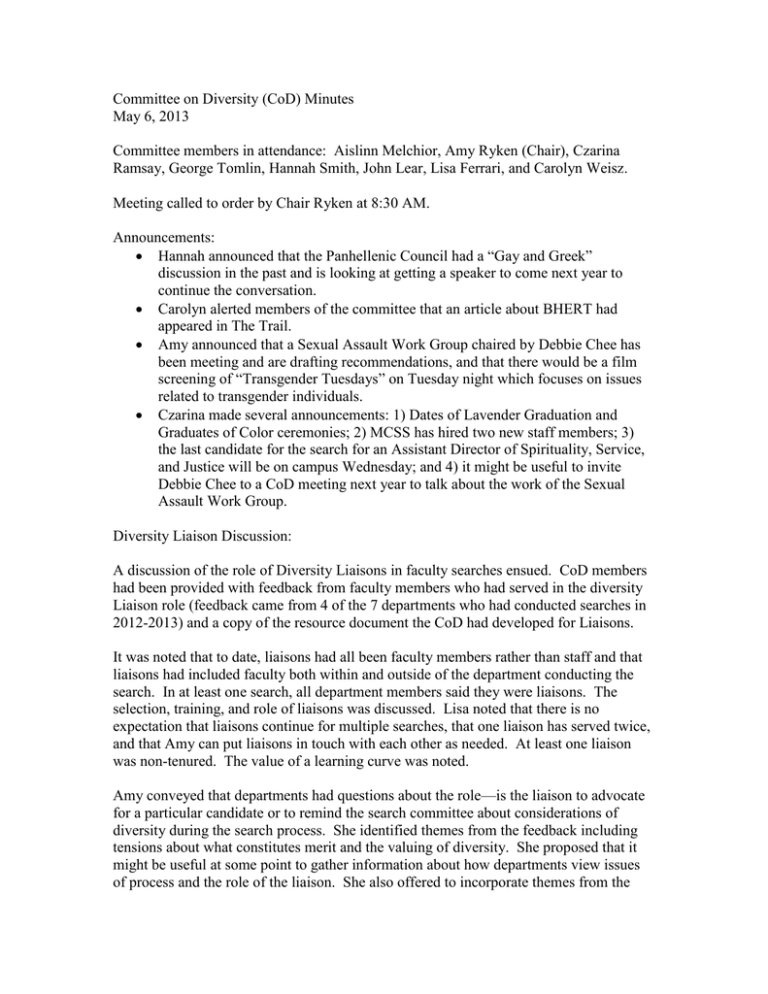
Committee on Diversity (CoD) Minutes May 6, 2013 Committee members in attendance: Aislinn Melchior, Amy Ryken (Chair), Czarina Ramsay, George Tomlin, Hannah Smith, John Lear, Lisa Ferrari, and Carolyn Weisz. Meeting called to order by Chair Ryken at 8:30 AM. Announcements: Hannah announced that the Panhellenic Council had a “Gay and Greek” discussion in the past and is looking at getting a speaker to come next year to continue the conversation. Carolyn alerted members of the committee that an article about BHERT had appeared in The Trail. Amy announced that a Sexual Assault Work Group chaired by Debbie Chee has been meeting and are drafting recommendations, and that there would be a film screening of “Transgender Tuesdays” on Tuesday night which focuses on issues related to transgender individuals. Czarina made several announcements: 1) Dates of Lavender Graduation and Graduates of Color ceremonies; 2) MCSS has hired two new staff members; 3) the last candidate for the search for an Assistant Director of Spirituality, Service, and Justice will be on campus Wednesday; and 4) it might be useful to invite Debbie Chee to a CoD meeting next year to talk about the work of the Sexual Assault Work Group. Diversity Liaison Discussion: A discussion of the role of Diversity Liaisons in faculty searches ensued. CoD members had been provided with feedback from faculty members who had served in the diversity Liaison role (feedback came from 4 of the 7 departments who had conducted searches in 2012-2013) and a copy of the resource document the CoD had developed for Liaisons. It was noted that to date, liaisons had all been faculty members rather than staff and that liaisons had included faculty both within and outside of the department conducting the search. In at least one search, all department members said they were liaisons. The selection, training, and role of liaisons was discussed. Lisa noted that there is no expectation that liaisons continue for multiple searches, that one liaison has served twice, and that Amy can put liaisons in touch with each other as needed. At least one liaison was non-tenured. The value of a learning curve was noted. Amy conveyed that departments had questions about the role—is the liaison to advocate for a particular candidate or to remind the search committee about considerations of diversity during the search process. She identified themes from the feedback including tensions about what constitutes merit and the valuing of diversity. She proposed that it might be useful at some point to gather information about how departments view issues of process and the role of the liaison. She also offered to incorporate themes from the current responses into the resource sheet for liaisons and departments. John suggested that liaisons continue to share reflections about process at the end of each search. It was also recommended that we extend the liaison role to visiting full-time faculty searches, in part because we can take risks in visiting searches and learn from these hires. Amy indicated that she would e-mail Kris about this recommendation. John also said that it would be useful for the University to have a conversation about international applicants for faculty positions. He asked whether this fits within our consideration of diversity, whether there are obstacles for candidates in the country on student visas, and how search committees understand their degrees and references from abroad. George raised a question about what it means to be proactive in seeking diverse candidates and noted that the answer was not obvious from the liaisons’ feedback. He also asked whether departments knew what it meant to use welcoming language. Amy noted that one liaison has requested discipline specific resources about diversity in hiring. John asked whether there is a role HR can play in gathering information about the identity of candidates and a discussion ensued about legality. Czarina noted that staff applicants are asked to complete an intake form that asks about race and gender (completion is optional). Aislinn asked about whether we could get information about family background to identify first-generation college students. The notion of “inviting” such information was discussed. Amy indicated that she could ask Cindy Matern in HR about this. She also noted that CoD could possibly meet with HR to discuss how HR addresses issues of diversity in its search trainings. She noted that a challenge to the process is that search processes are largely decentralized and dynamic, and some departments rarely do searches. Amy summarized next steps she offered to take including 1) asking Cindy and/or Kris about a handout that will show statistics regarding faculty diversity; 2) revising the guidelines for liaisons to suggest that departments discuss the role of the liaison at the beginning of a search; 3) emailing Kris about including liaisons in 1-year visiting searches; and 4) emailing Kris/Cindy about information available from HR. Graduation Requirement Discussion: The CoD then debriefed about the discussion of the diversity graduation requirement that had taken place at the Chairs Meeting. CoD members had received written feedback from Department/Program Chairs, as well as feedback or summaries of feedback from the Student Governing Council, Psychology, and individual faculty members. It was noted that the written feedback was informative, and that student voices, represented by feedback Hannah had collected and presented at the Chairs meeting, were valuable. A theme raised at the meeting was that the entire core should be reviewed, and this was identified as a possible side-track to the process. Amy noted that she had met with two faculty members who conveyed appreciation and respect for the effort and thought we had facilitated a serious conversation. Both were also highly concerned that “advocates and zealots” are “pushing” this. Hannah commented that by NOT teaching these things aren’t you NOT teaching a world-view (Amy agreed with her). John raised a question about positionality and whether or not student engagement and reflection about their own identity was a necessary piece. Aislinn noted that there is a lot riding on the rubrics and that they are not disciplinary specific. Amy noted that one chair said “Show me the data on this.” She commented that this is a newer pedagogy without lots of data available … which itself is a dynamic that results from the privileging of particular worldviews represented in the status-quo. Amy conveyed her impression that the overall tone in the written responses was supportive that we can work on concerns and questions that were raised. Czarina asked how we can continue a conversation about accountability of departments to engage in self-examination (as a response to the comments about zealots) and what role the Chief Diversity Officer might have in generating this kind of conversation once he has acclimated to the campus. The CoD expressed sincere appreciation to Amy for the extensive and effective work she had done as chair this year. At 9:30 am, the committee adjourned for the summer. Respectfully submitted, Carolyn Weisz
